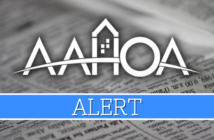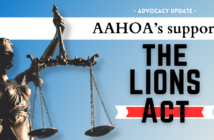With help from members and Industry Partners, AAHOA advocates for hard-hit hotel industry amid coronavirus pandemic
by NICK FORTUNA
With the coronavirus pandemic sending the economy off a cliff and making government intervention inevitable, AAHOA Members stepped up in a big way, making their voices heard in Washington and state capitals at a crucial time for the industry and the nation.
LEADERSHIP SPEAKS OUT
In a video message to members on March 19, Cecil P. Staton, AAHOA President & CEO, said the association’s advocacy team in Washington was working with its partners in the hospitality industry, the Trump administration, and congressional leaders to ensure hoteliers and their employees were included in any economic stimulus legislation being drafted.
In addition to a rapid disbursement of financial assistance, AAHOA called for the federal government to give hoteliers more flexibility in dealing with their banks and lenders to help them address their liquidity issues.
“We need fewer bureaucratic obstacles and more access to capital so hoteliers can keep the lights on, make payroll, and pay the mortgage,” Staton said. “To put this crisis in real terms for our government officials, we need you to share your stories. Tell us what you’re seeing and how your business is being impacted by this crisis.”
INCREDIBLE MEMBER RESPONSE
The response from AAHOA Members was overwhelming. In one week alone, members sent more than 21,000 letters to federal and state legislators, speaking with a unified voice and demanding action.
The $2 trillion emergency spending package signed by President Donald Trump on March 27 – the Coronavirus Aid, Relief, and Economic Security Act, or CARES Act – does provide some relief for the hospitality industry. It includes almost $350 billion to create the Paycheck Protection Program, which provides loans and loan guarantees to struggling small businesses so they can pay their rent or mortgages, meet payroll, and cover other operating costs.
The PPP was designed to reduce the red tape and guardrails that can make getting loans from the Small Business Administration challenging. It also incentivizes businesses to keep employees on the payroll by offering them loan forgiveness.
ASSOCIATIONS WORKING TOGETHER
Chip Rogers, President CEO of the American Hotel & Lodging Association, praised the president and Congress for passing the bill but cautioned that it isn’t nearly enough to shore up the hotel industry. The CARES Act caps the amount small businesses may borrow at 250 percent of their average monthly payroll, up to $10 million, but AHLA was pushing for the limit to be at 400 percent.
“We are disappointed that Congress was unable to increase the limits on Small Business Administration loans so that they would be more workable for our industry during this unprecedented halt in travel,” Rogers said in a statement. “Under the current limits, hoteliers will only be able to meet their payroll and debt-service obligations for an estimated four to eight weeks.”
Under the CARES Act, businesses will receive SBA loan forgiveness if they rehire their furloughed employees by June 30, and the AHLA would like a future stimulus bill to push that deadline back to Sept. 30, giving the industry more time to recover.
“While we all look forward to the day when it is safe to resume traveling, the reality is that most hotels today are facing single-digit occupancy, and that is unlikely to change in such a short time period,” Rogers said. “With no revenue coming in, hoteliers can’t make their debt payments, which will result in the business going under and employees losing their jobs permanently.
“As Congress weighs additional stimulus programs in the coming weeks, we urge them to swiftly address this shortcoming in the CARES Act.”
WHAT HAPPENS AFTER THE CARES ACT?
Immediately after passage of the CARES Act, many lawmakers and business advocates encouraged Congress to begin work on supplemental aid packages. The prospect of more emergency spending makes it important for AAHOA Members to continue to contact their legislators and tell them what’s at stake for their businesses.
In a video message to members March 20, AAHOA Chairwoman Jagruti Panwala said it’s never been more important for members to share their personal stories with the association and legislators. Doing so helps AAHOA make the case for additional financial relief to lawmakers.
“In times like these, we must remain focused and united,” Panwala said. “We all need to make sure our voices are heard, and we need to let them know that they must support our industry at this time.”
AAHOA’s website makes it easy for members to do their part. It provides a template for a letter to federal legislators calling for a robust stimulus package. The letter makes it clear how vital AAHOA Members and the broader hotel industry are to the economy. AAHOA’s nearly 20,000 members own almost half of the hotels in the United States, employing approximately 600,000 workers and accounting for more than $10 billion in payroll annually.
The letter details the challenges facing hoteliers and proposes many solutions, including a hospitality workforce relief fund, a bolstered unemployment insurance program, increased availability of small-business loans, immediate access to capital, regulatory flexibility with lenders, and the elimination of administrative burdens in obtaining SBA disaster-relief loans.
A separate letter template urges state and local lawmakers to designate hotels as essential businesses and to consider an array of relief measures, including the deferral of state and local hotel, property, business, and sales taxes. The letter calls for the deferral of municipally owned utility bills and the creation of economic development programs, grants, and loans for business owners.
“As you have noticed, these brands are listening and taking actions to mitigate the cost pressures that we are all facing,” Panwala said. “One brand even cut their royalty fee by 50 percent. But we’re not done yet. Owners are hurting, and we will continue to advocate for more relief for our hoteliers, who are the backbone of this industry and of these brands.”
GET INVOLVED and STAY INFORMED
Panwala also encouraged hoteliers to speak with their brand representatives about their ongoing challenges.
AAHOA has been updating the COVID-19 section of its website daily, consolidating information and resources from the Department of Labor, SBA, and other government agencies, to name a few. There are letter templates for dealing with vendors, suppliers, and financial institutions. And AAHOA’s partners at Ecolab have developed a hospitality resource library to help hotel operators learn best practices for cleaning and disinfecting amid a pandemic. The library offers downloads and instructional videos, among other resources.
By the end of April, the association had produced more than 60 webcasts, each covering an important pandemic-related issue for hoteliers. Topics have included leadership in a time of crisis, a detailed look at the CARES Act, the impact of the pandemic on hotels’ supply chains, and sales and revenue tips for a down market.
Through April 17, those webcasts had been viewed by more than 9,000 hoteliers.
Members with specific questions about navigating any aspect of the pandemic can email the association at [email protected].
Though the circumstances surrounding this pandemic are unique, the hotel industry has seen its share of hardship over the years, and it’s always persevered. In April, Staton sought to remind AAHOA Members of their resilience, and that they can count on the association to advocate for them in good times and in bad. He also noted that things eventually will return to normal, even if normal is hard to envision at present.
“People will still travel, and they will still need a place to stay when they do,” Staton said. “Our industry weathered 9/11. We made it through the financial crisis of 2008. We’ve been through many recessions. And we’ll get through this crisis by supporting one another and standing strong together. AAHOA is here for you now so you can be there for your employees and guests now and when we get through this crisis.”
For more information on how AAHOA is helping hoteliers navigate this devastating pandemic, visit aahoa.com/covid-19.



